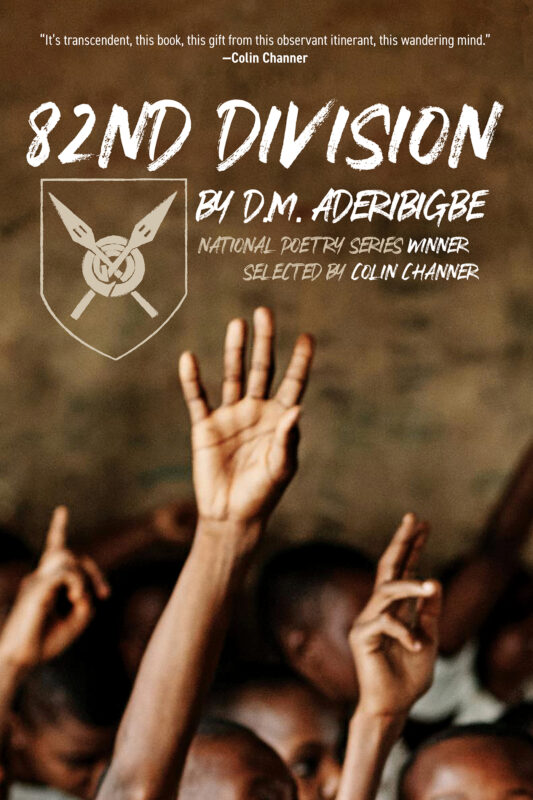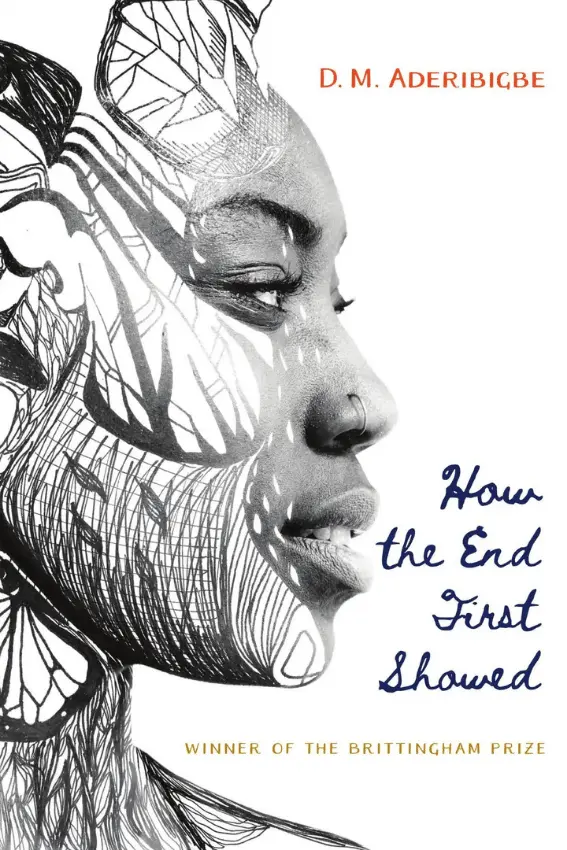By D.M. ADERIBIGBE
82nd Division
(Selected by acclaimed poet/novelist Colin Channer for the National Poetry Series, 82nd Division is a lustrous love song to the author’s native Nigeria)
THE POEMS IN 82ND DIVISION, written in various poetic forms such as the villanelle, sonnet, blues poem, duplex, ode, and dramatic monologue, among many others, are collectively a love song to the author’s native Nigeria―a former British colony. In the book, whose title poem chronicles the lives of West African soldiers who fought alongside the British in World War II, Aderibigbe examines his homeland’s colonized past with brutal clarity and striking musicality, and considers how this past continues to shape every facet of his life and contemporary Nigerian life―be it the holidays that are celebrated, the preferred language of interaction among peers and friends, how a mother expresses love to her child, or the type of movies and snacks consumed.
Beyond its thematic unity, lustrous language, and formal virtuosity, this sparkling collection is tied together by Aderibigbe’s graceful exploration of the humanity of the people, landscape, and histories that populate the book’s pages.
Praise for 82nd Division:
“It’s transcendent, this book, this gift from this observant itinerant, this wandering mind.”
Reviews of 82nd Division:
“A poet with an ear for musicality that is both enchanting and sorrowful, Aderibigbe writes at the intersection of West Africa and “the West,” plotting a vision that is both deeply historical and urgently contemporary.”
“Overhanging the book’s personal and historical losses—the deaths of a mother and a grandmother, colonial violence freshly reenacted on the page—are the paradoxical losses brought about by Aderibigbe’s prodigious poetic gifts.”
By D.M. ADERIBIGBE
How The End First Showed
(Wisconsin Poetry Series)
Widening his gaze to capture the moral rhythms of life in Lagos, he embraces themes of love, spirituality, poverty, compassion, sickness, and death. Aderibigbe offers both an extended elegy for his mother and poems addressed to children of the African continent, poems that speak to the past that has made them.
“A debut that electrifies and ignites beacons of much-needed understanding through even the darkest of days. These memorable poems twist and tumble across entire countries while making maps of love and heartbreak. A brilliant beginning. Remember this name: Aderibigbe.”
“How the End First Showed by D.M. Aderibigbe is a powerful testament to the women in his family — especially his grandmother and mother — who were abused for years by the men they loved. Aderibigbe, who grew up in Lagos, Nigeria, won the Brittingham Prize for this striking collection. The book quietly challenges his native country’s entrenched ideas about male supremacy and shows how the strength and resilience of women help repair what has been broken. As he examines a painful legacy and questions the present, he creates remarkably memorable poems and posits haunting questions.”
“In the urgent, abrupt, incantational poems of D. M. Aderibigbe, an essential gesture is simile: the explicit, striving word ‘like’ recurs often. And in every poem Aderibigbe thinks in metaphor. In a world of difference, amid unique strokes of memory and abandonment, violence and love, that action of likeness attains spiritual force.”
“The poems in Nigerian poet D.M. Aderibigbe’s debut collection, “How The End First Showed,’’ out this month from University of Wisconsin Press, where it won the Brittingham Prize in Poetry, center around his mother, his grandmother. They are odes to these women and bottomless laments for the physical abuse they suffered. Aderibigbe, grew up in Lagos and got his MFA in poetry at Boston University, and this collection is a sinewy, frank, and luminous examination of violence and love, a reckoning with what was and what could be. “I’ll rewrite my childhood./ Amputating my father’s hands/ and legs with ink, like rebels/ chop innocuous civilians.” Poetry becomes a means of power, tribute, sense-making. There is brutality here, and pure beauty as well.”
“The poetry he (D.M. Aderibigbe) writes carries universal appeal…How the End First Showed is not merely a collection of Nigerian poems, it is an effort to forge transnational literature.”
Aderibigbe writes with a beautiful simile and chilling rhythm about the domestic violence he witnessed as a child.
“By speaking to the strength and willpower possessed by motherly figures like grandmother, mother, aunt and sister, he is giving a voice to the women who were silenced by abuse.”
“Throughout this collection, Aderibigbe remakes family stories handed down through generations and across continents into poems with jagged edges that rip at his cultural and familial patrimony.”


